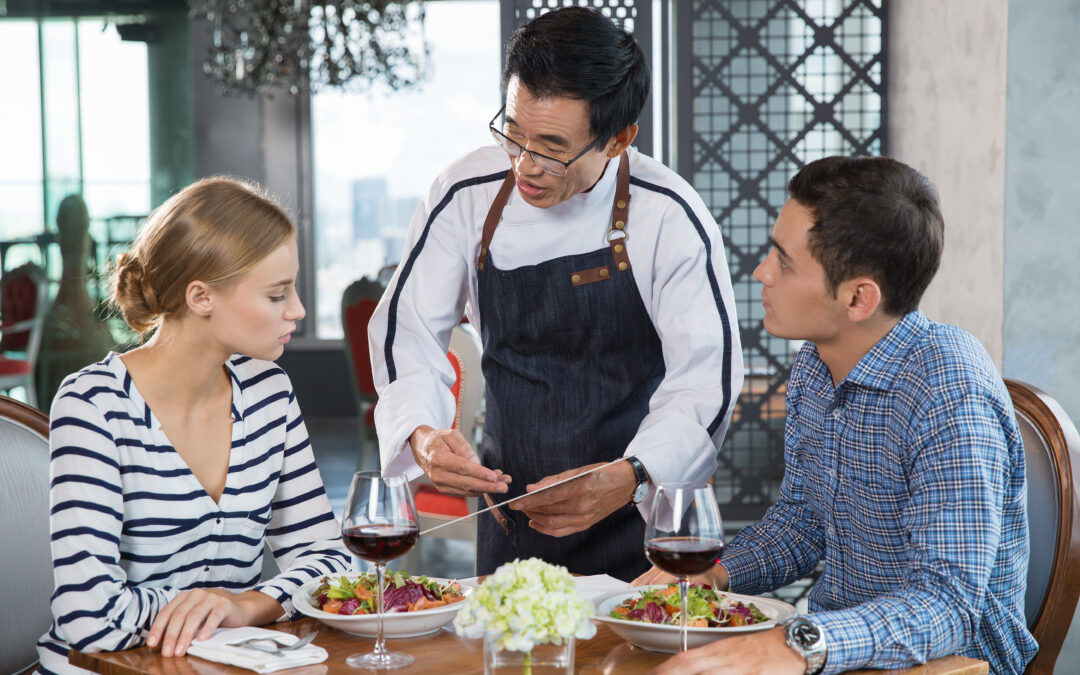
by Ross Kingsley | Aug 10, 2025 | RESTAURANT BUSINESS: BEHIND THE KITCHEN DOOR
Upselling is an essential skill in the restaurant industry. When executed thoughtfully, it enhances the dining experience for guests while boosting revenue for the establishment. Here are four techniques that every restaurant can implement:
Personal Recommendations
Guests value suggestions that feel tailored to their preferences. Servers can recommend premium items, such as the chef’s special or an upgraded version of a dish. For example, instead of suggesting a standard cocktail, they might propose a craft version with top-shelf spirits. Personalized phrasing works wonders, such as, “If you’re in the mood for seafood, our pan-seared scallops are exceptional—they’ve been a hit tonight.” The goal is to make guests feel like they’re receiving insider tips rather than a sales pitch.
Highlighting Add-Ons
Small additions can significantly enhance both the meal and the check total. Servers can recommend add-ons like a side of truffle fries with a burger or a drizzle of premium olive oil over a salad. The way these suggestions are phrased is critical. Instead of a plain, “Would you like bacon on that?” try, “A crispy bacon topping takes this burger to the next level—it’s a favorite with our regulars.” Such thoughtful suggestions feel like enhancements rather than upsells.
Suggesting Desserts
Desserts are an often-overlooked opportunity to upsell, but a little nudge can make a difference. Rather than asking, “Do you want dessert?” servers can paint a picture: “We have a rich tiramisu today, made fresh this morning. It’s light but indulgent and pairs beautifully with our espresso.” Guests are more likely to indulge when the experience is framed as a perfect ending to their meal.
Train Staff to Identify Opportunities
Not every upsell works for every guest, which is why training staff to read the room is essential. Families might appreciate meal bundles or kid-friendly options, while couples on a date might lean toward specialty cocktails or shared plates. Servers should learn to observe cues—like a guest’s interest in the wine menu or their response to a recommendation—and tailor their approach accordingly. Empowering staff with the right skills ensures upselling feels natural and guest-focused.
When applied tactfully, these upselling strategies not only increase revenue but also leave guests feeling valued and satisfied. It’s about delivering an elevated dining experience, one thoughtful suggestion at a time.
Image Credit: https://www.freepik.com
_ _ _
© CHURRASCO PHUKET STEAKHOUSE / ALL RIGHTS RESERVED
Churrasco Phuket Steakhouse serves affordable Wagyu and Black Angus steaks and burgers. We are open daily from 12noon to 11pm at Jungceylon Shopping Center in Patong / Phuket.
We are family-friendly and offer free parking and Wi-Fi for guests. See our menus, reserve your table, find our location, and check all reviews here:
https://ChurrascoPhuket.com/
#Churrascophuket #jungceylon #phuketsteakhouse #affordablewagyu #wagyu
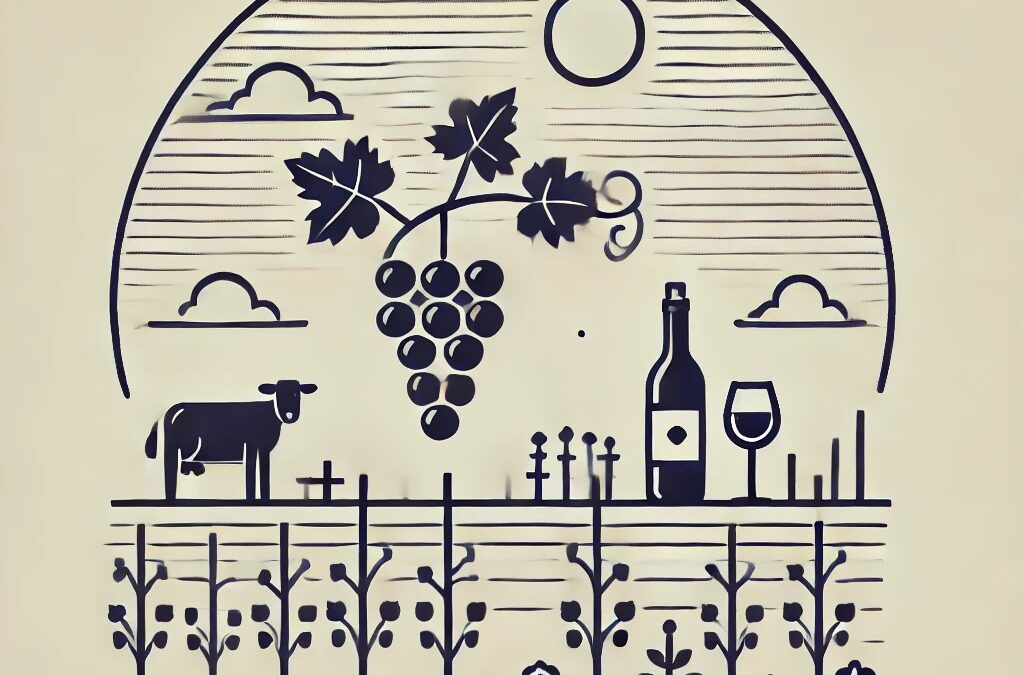
by Ross Kingsley | Aug 10, 2025 | WINES: UNCORKING THE MYSTERY
Biodynamic wine is more than just a buzzword; it represents a philosophy rooted in a harmonious relationship between the vineyard and its environment. This method extends beyond organic practices, incorporating holistic farming techniques based on the principles of Austrian philosopher Rudolf Steiner, who introduced biodynamics in the 1920s.
What Does Biodynamic Mean?
Biodynamic farming treats the vineyard as a living organism. It emphasizes soil health, biodiversity, and ecological balance. Practitioners follow a unique lunar and astrological calendar to guide planting, pruning, and harvesting. Preparations like cow horn manure (preparation 500) and silica sprays are used to enhance soil fertility and vine vitality.
A Brief History
Steiner’s ideas emerged during a period of agricultural decline, offering an alternative that emphasized sustainability and spirituality. The Demeter Association, founded in 1928, became the certifying body for biodynamic products, including wines. Over time, these principles gained traction among winemakers seeking sustainable and terroir-driven practices.
Adoption and Leading Producers
Biodynamic winemaking has found a dedicated following, especially in Europe. Prestigious estates like Domaine de la Romanée-Conti (France), Domaine Zind-Humbrecht (Alsace), and Austria’s Nikolaihof lead the charge. In the New World, wineries like California’s Benziger Family Winery and Chile’s Emiliana showcase biodynamic excellence.
Consumer Acceptance and Market Growth
Initially met with skepticism, biodynamic wines are now celebrated for their purity, complexity, and expression of terroir. While certification adds credibility, many wineries practice biodynamics without formal labels. Consumer demand for sustainable and ethical products has further boosted their popularity.
Why Biodynamic Wines Matter
As climate change and environmental concerns grow, biodynamic wines offer a pathway to sustainable viticulture. Their rising acceptance among connoisseurs and casual drinkers alike underscores their appeal—a marriage of quality, tradition, and ecological mindfulness.
Image Credit:
Home
_ _ _
© CHURRASCO PHUKET STEAKHOUSE / ALL RIGHTS RESERVED
>>> Reprinting, reposting & sharing allowed, in exchange for a backlink and credits <<<
Churrasco Phuket Steakhouse serves affordable Wagyu and Black Angus steaks and burgers. We are open daily from 12noon to 11pm at Jungceylon Shopping Center in Patong / Phuket.
We are family-friendly and offer free parking and Wi-Fi for guests. See our menus, reserve your table, find our location, and check all reviews here:
https://ChurrascoPhuket.com/
#Churrascophuket #jungceylon #phuketsteakhouse #affordablewagyu #wagyu
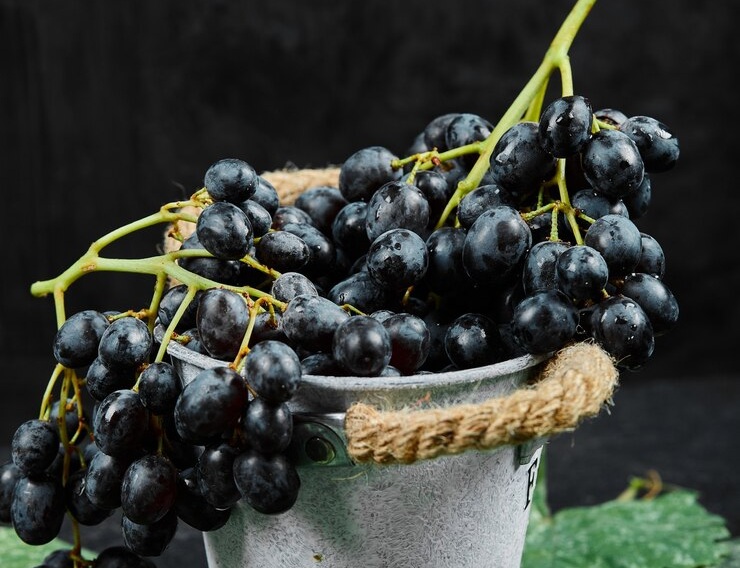
by Ross Kingsley | Jul 13, 2025 | DECODING GRAPES: FROM VINES TO VINTAGE
Merlot, one of the world’s most beloved grape varieties, is a red wine staple celebrated for its soft texture and versatility. Its name, derived from the French word for blackbird (merle), reflects its deep, dark color and the bird’s fondness for the grape. To truly appreciate this varietal, it’s worth exploring its origins, history, notable wines, and global reach.
Origins and History
Merlot originated in the Bordeaux region of France, where it thrives as one of the primary grape varieties in the famed Bordeaux blends. The first recorded mention of Merlot dates back to the late 18th century when a French wine official noted its quality and early ripening characteristics. Over the years, it became a cornerstone of winemaking in Bordeaux, particularly on the Right Bank, where it dominates blends from iconic appellations like Saint-Émilion and Pomerol.
Merlot’s adaptability and reliability gained traction outside France in the 20th century, making it a global phenomenon. Its soft tannins and approachable flavors allowed it to stand out in the growing wine markets of the United States, Italy, and South America.
Famous Wines Featuring Merlot
Some of the world’s most prestigious wines feature Merlot prominently. In Bordeaux, Château Pétrus from Pomerol is perhaps the ultimate expression of the grape, often commanding some of the highest prices in the wine world. Château Cheval Blanc, a Saint-Émilion blend, also highlights Merlot’s ability to contribute to a wine’s elegance and aging potential.
Outside France, Merlot shines in varietal wines from California’s Napa Valley, where producers like Duckhorn Vineyards have gained acclaim. In Italy, it is a key component of “Super Tuscans,” where it complements local varietals like Sangiovese.
Geographical Reach
Merlot’s adaptability has enabled it to flourish in diverse climates. France remains its spiritual home, but it has found success in regions as varied as Washington State, Chile, Argentina, and Australia. In cooler climates, Merlot produces wines with red fruit and herbal notes, while warmer regions bring out its plum, blackberry, and chocolate characteristics.
Why Merlot Matters
Merlot’s versatility makes it a favorite for wine enthusiasts and winemakers alike. Whether in a complex Bordeaux blend or a fruit-forward varietal wine, Merlot offers something for everyone, demonstrating why this grape continues to be a cornerstone of global winemaking.
Image Credit: Freepik.com
_ _ _
© CHURRASCO PHUKET STEAKHOUSE / ALL RIGHTS RESERVED
>>> Reprinting, reposting & sharing allowed, in exchange for a backlink and credits <<<
Churrasco Phuket Steakhouse serves affordable Wagyu and Black Angus steaks and burgers. We are open daily from 12noon to 11pm at Jungceylon Shopping Center in Patong / Phuket.
We are family-friendly and offer free parking and Wi-Fi for guests. See our menus, reserve your table, find our location, and check all reviews here:
https://ChurrascoPhuket.com/
#Churrascophuket #jungceylon #phuketsteakhouse #affordablewagyu #wagyu
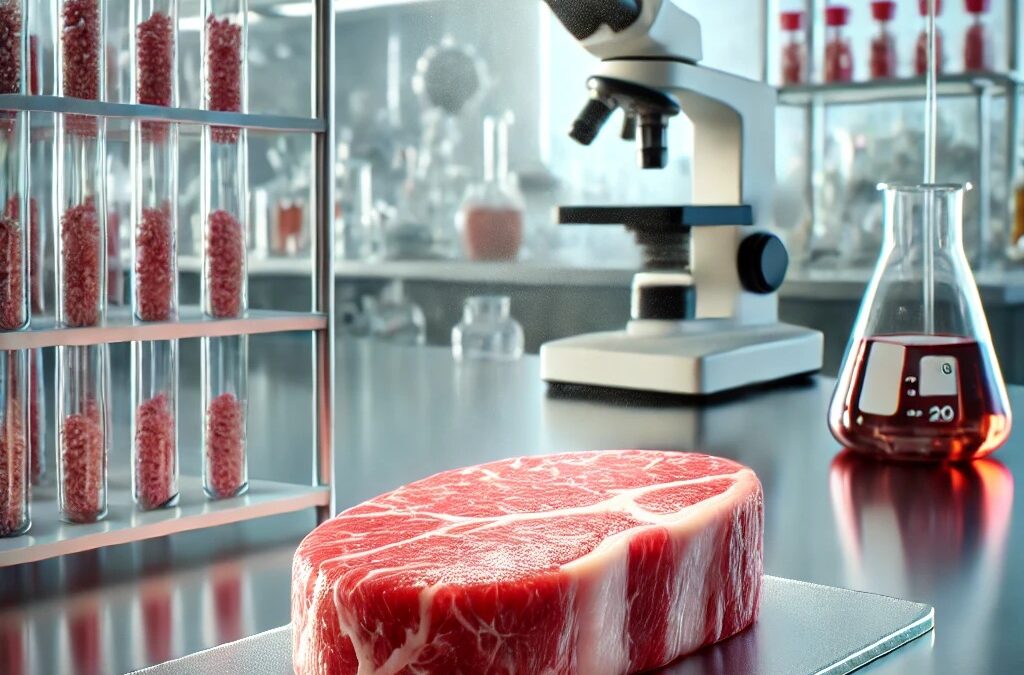
by Ross Kingsley | Jun 15, 2025 | KNOWLEDGE: MEAT ESSENTIALS
At Churrasco Phuket Steakhouse, we do not offer any meat substitutes, plant based “meat”, or lab grown proteins. But as an enterprise with a social conscience and with an eye on the future, we keep ourselves informed of developments in sustainable nutrition.
Lab-grown beef, also known as cultivated or cultured meat, has emerged as a revolutionary idea in the food industry. By growing meat directly from animal cells in bioreactors, this innovation aims to address some of the most pressing global challenges, such as food security, environmental degradation, and animal welfare. However, it is also a subject of intense debate, with significant hurdles to overcome.
The promise of lab-grown beef lies in its potential to reduce the environmental impact of traditional livestock farming. Conventional meat production contributes significantly to greenhouse gas emissions, deforestation, and water usage. Cultured meat could mitigate these issues, as it requires fewer resources and produces less waste. Additionally, it eliminates the need for animal slaughter, appealing to those concerned about animal welfare.
Despite its promise, lab-grown beef faces several challenges. One of the biggest is scalability. Producing cultured meat at a price and volume comparable to conventional beef remains a significant technological and financial hurdle. Current production costs are prohibitively high, with bioreactors and cell culture media being expensive to scale up. Furthermore, regulatory approval processes are complex, varying by country, and consumer acceptance is still uncertain. Many people are hesitant to embrace lab-grown products due to perceived unnaturalness or safety concerns.
Will lab-grown beef succeed? The answer depends on technological advancements, market acceptance, and regulatory frameworks. Governments and private investors are already pouring billions into research and development, showing confidence in its future. However, success also requires addressing ethical concerns, building public trust, and ensuring affordability.
In the long term, we predict that lab-grown beef will never replace traditional farming, but could complement it. By offering a more sustainable and ethical option, it has the potential to reshape the food industry and create a more balanced approach to meat consumption. Whether it fulfills its promise remains to be seen. We will keep observing.
_ _ _
© CHURRASCO PHUKET STEAKHOUSE / ALL RIGHTS RESERVED
Churrasco Phuket Steakhouse serves affordable Wagyu and Black Angus steaks and burgers. We are open daily from 12noon to 11pm at Jungceylon Shopping Center in Patong / Phuket.
We are family-friendly and offer free parking and Wi-Fi for guests. See our menus, reserve your table, find our location, and check all reviews here:
https://ChurrascoPhuket.com/
#Churrascophuket #jungceylon #phuketsteakhouse #affordablewagyu #wagyu
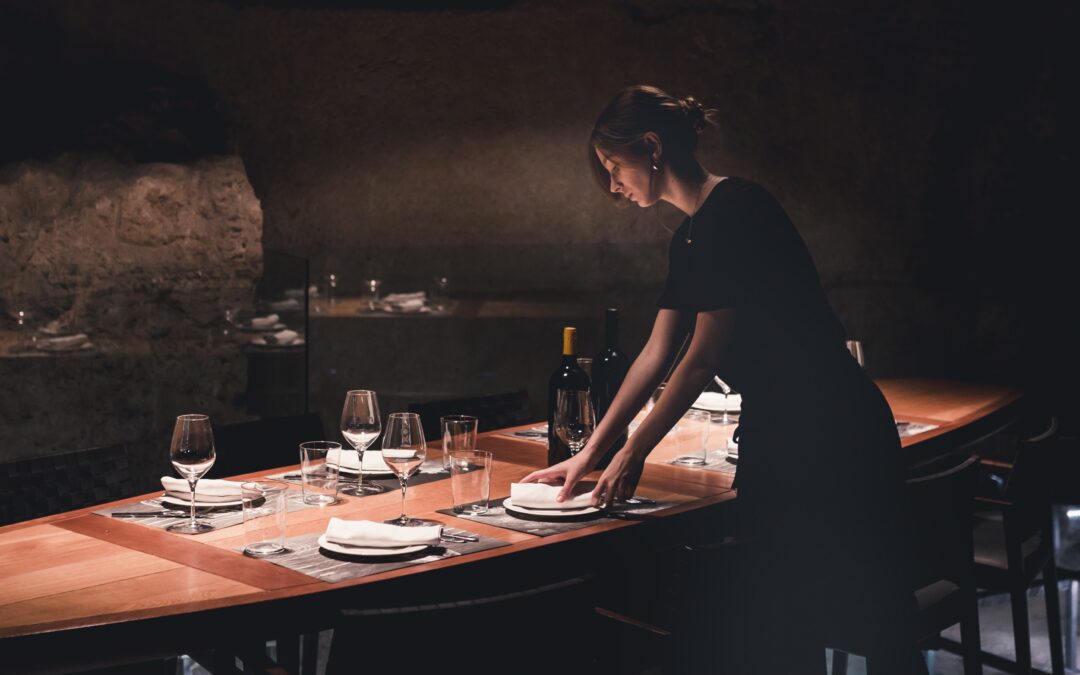
by Ross Kingsley | Jun 1, 2025 | BLACK BOX: RANTS, RAVES, REVIEWS & RECIPES
There was a time when going out to eat felt like a very special moment. Not just a pause in the day, but something that carried meaning. A little ritual. You dressed up, made a plan, maybe even looked forward to it all week. It wasn’t about convenience. It was about connection. And honestly, I miss that.
These days, dining out feels different. We go because we’re tired, because our schedules are packed, or because cooking feels like a chore. For many, it’s no longer a treat—it’s just part of the routine. And in becoming so familiar, it’s lost something.
When Restaurants Felt Human
What I remember most from the restaurants I grew up with wasn’t the food. It was how they made you feel. The neighborhood spot where the owner waved you in. The elegant restaurants where my dad entertained clients, sometimes allowing me to tag along. Tableside gueridon services with flambéed dishes and second servings. well dressed staff remembering what you ordered last time, and offering it without asking. The feeling of being seen—like you mattered.
You still find places like that. But they’re getting harder to come by. Small, independent restaurants—the kind that quietly anchor a community—are being squeezed out. Rents climb, staffing gets tougher, and chains move in. What survives is often what cab be scaled. It feels strange and uncomfortable. There are more restaurants than ever, yet fewer and fewer feel personal and unique.
From Hospitality to System
As dining became routine, the industry adapted. Menus got templated and digitised. Dining rooms were built to be branded, not warm. What was once a craft turned into a system. And somewhere in that push for efficiency, a lot of the humanity faded out.
Now we order through tablets, and get served by someone who might not be there next week. The experience feels scripted—polite, but detached. I’ve had meals recently that were perfectly fine, and yet I walked out feeling nothing. Not because the food was bad—but because there was no spark. No care.
Designed for the Scroll, Not the Table
Social media’s influence hasn’t helped. Many restaurants today feel built for the camera more than the customer. Beautiful dishes, stylized lighting, catchy wall quotes—all designed to be posted, not savored. And then there’s the increasingly controversial influencer economy. A viral dish can pack a restaurant overnight, even if the food is just average. The algorithm rewards aesthetics, not substance. And when style outweighs care, the experience becomes hollow. We’re dining for the scroll, not the moment.
Dining, Reduced to Transaction
We’ve also blurred the line between dining and delivery. Apps make it easier than ever to eat from restaurants without stepping inside one. But the cost is the experience. Restaurants become vendors, not venues. Food becomes product, not memory. Even when we do dine out, phones sit on the table. Meals are documented more than shared. We no longer expect a restaurant to offer meaning—just availability and speed.
A Few Still Get It Right
That said, some places still remind you why dining out can be special. Places that use technology to support the experience, not replace it. Where service feels human. Where you’re remembered. They’re not always trendy or polished. But they’re real. And real lingers longer than perfect. At Churrasco Phuket Steakhouse, this is at the core of our philosophy and daily efforts. As we keep telling out team over and over again: “We are not about selling food. We are here to make our guests happy”. It seems to work, judging by the long and growing litany of 5-star reviews on Google – and even that slowly dying legacy review site, TripAdvisor.
The Part We Play
It’s tempting to point fingers at the industry. But restaurants reflect and rrespond to demand. If we chase convenience or viral novelty over substance, the message is clear to those who invest in the restaurant business. But if at the same time, we choose the places that feel thoughtful, sincere, and human—if we reward care—we can shift the landscape.
A 2023 OpenTable survey found that nearly 80% of diners ranked “authenticity” above price or even food quality. That appetite for something real? It’s there. We just have to act on it.
And I think that’s worth remembering every time we go out to eat. Don’t you?
Image Credit: https://freepik.com
_ _ _
© CHURRASCO PHUKET STEAKHOUSE / ALL RIGHTS RESERVED
Reprinting, reposting & sharing allowed, in exchange for a backlink and credits
Churrasco Phuket Steakhouse serves affordable Wagyu and Black Angus steaks and burgers. We are open daily from 12noon to 11pm at Jungceylon Shopping Center in Patong / Phuket.
We are family-friendly and offer free parking and Wi-Fi for guests. See our menus, reserve your table, find our location, and check all guest reviews here:
https://ChurrascoPhuket.com/
#Churrascophuket #jungceylon #phuketsteakhouse #affordablewagyu #wagyu





